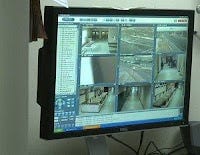Entire public school system is being monitored at police headquarters.

By J.D. Tuccille:
Albuquerque, NM - Rare though they are, horrific events like the Newtown shooting inevitably provoke a variety of responses. The intent is to head off a recurrence of the sort of crime that, truth be told, very likely can't be completely prevented, if for no other reason than that so many of the perpetrators seemingly have little interest in surviving their deeds. But some of the responses, like encouraging people to take responsibility for defending themselves and those around them, offer the possibility of reducing the damage done by rampage killers. Some responses, like gun restrictions and video-game censorship, put widespread civil liberties at the mercy of opportunistic control freaks. And some responses seem designed to turn public schools into replica prisons. Albuquerque's multi-school surveillance, is being centrally monitored from the police headquarters dispatch center.
That Albuquerque actually has something called "Public Schools Police" is a strong clue that the local educational establishment has been wandering down the road to Sing Sing for quite some time, now. So the network of surveillance cameras isn't a newthing — but it's growing and probably not likely to face any budgetary pressure or policy challenges in the near future.
As KRQE Reports:
The digital cameras are motion activated, grabbing onto people as they move. They're in hallways, libraries, cafeterias, playgrounds and parking lots.
"Someone watching the camera can see if a person comes on campus who doesn't belong there, and they can immediately call help if they need to or go to the door and see who the person is," explained Lt. Rider. "They can address them before they even enter the campus."
So far they've helped solve vandalism and even keep an eye on teachers, but they're also tracking students.
You think they're creepy? Why do you hate children?Well, that's the likely response to anybody raising even the mildest objections to authoritarian power-grabs that are justified in the name of keeping the little darlings out of harm's way. Though it's a bit difficult to fathom the benefits of a security system based on centrally monitored video cameras when "officers can not be everywhere" and, in fact, may be nowhere near the school in question. You'd think something a bit more flexible and on-the-spot would make more sense.
But then, nobody would get to sit in a room, watching kids on a mosaic of video feeds. And besides, "APS also uses the cameras for other things. Monday they used them to monitor weather conditions especially at their East Mountain campuses."
http://reason.com/blog/2013/01/15/albuquerques-solution-for-school-safety
Report criticizes school discipline measures used in Mississippi.
Less than three months after the Justice Department sued Meridian, Miss., after finding that school students there were routinely arrested without probable cause, a report by a group of civil rights organizations says that “overly harsh school disciplinary policies” are common throughout the state. The report, which is to be released Thursday, found that in one Mississippi school district, 33 of every 1,000 children were arrested or referred to juvenile detention centers; that in another, such referrals included second and third graders; and that in yet another, only 4 percent of the law enforcement referrals were for felony-level behavior, the most often cited offense being “disorderly conduct.”
“The school-to-prison pipeline is nothing new in Mississippi, and it is certainly not unique to Meridian,” the report says. “In fact, it is a problem that has plagued Mississippi schools statewide for years.”
In addition to statistics, the report described episodes in which a child was taken home by the police for wearing shoes that violated the dress code, and a school where misbehaving students were handcuffed for infractions as minor as not wearing a belt.
The report also found that, over all, Mississippi imposed out-of-school suspensions at a rate more than one and a half times the national average. In several districts, the rate was more than 9 times the national average, and in one, more than 17 times.
The report comes as lawmakers in many states, including Mississippi, are considering plans to place armed officers or guards in every school, a measure that has gained traction since the shootings in Newtown, Conn. While this report does not focus on that issue specifically, its authors suggest that the presence of more police officers could make a bad problem worse.
“Police who were initially put in schools to handle matters of safety have become involved in ordinary day-to-day disciplinary infractions,” said Erika Maye, a spokeswoman for the Advancement Project, a Washington-based group that helped prepare the report. The Mississippi chapters of the A.C.L.U. and the N.A.A.C.P., and a group called the Mississippi Coalition for the Prevention of Schoolhouse to Jailhouse, were also involved.
In August, the Justice Department released a letter of findings charging that the police in Meridian routinely arrested children at schools without probable cause, merely on the referral of school personnel. The letter found that students had been incarcerated for “dress code violations, flatulence, profanity and disrespect.”
http://www.nytimes.com/2013/01/17/education/report-criticizes-school-discipline-measures-used-in-mississippi.html?ref=us&_r=1&


